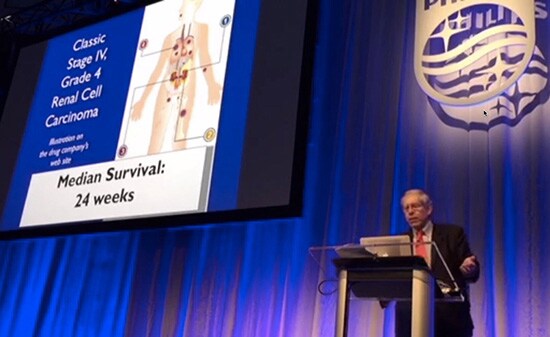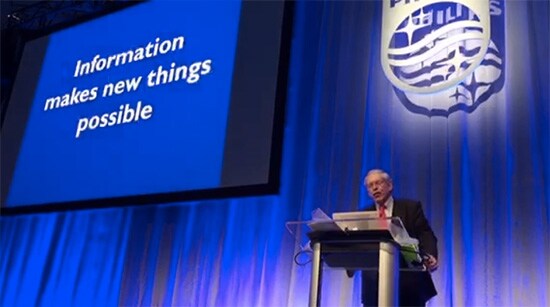For healthcare to achieve its best,
empower the patient and family.
Here’s a composite of four quote graphics Philips tweeted yesterday for World Cancer Day:
I’ve had the good fortune to cross paths with Philips Healthcare several times, most recently for a speech (video) at the big RSNA radiology convention in Chicago. I just love what they’re doing in partnership with REshape and Innovation Center at Radboud UMC, where my crazy-amazing friend Lucien Engelen is rapidly creating the future of health and care with Philips and Salesforce.com. Seriously: watch what will come out of that threesome!
So when Philips asked me to do a guest post for yesterday’s global #WorldCancerDay, I said sure. It ran on their blog yesterday.
“Knowledge is Power. Power to the people.”
For healthcare to achieve its best, empower the patient and family.
When the Web was born the term e-patient was coined by “Doc Tom” Ferguson to describe a new kind of patient, no longer in the dark but thoroughly empowered to achieve new things – because they have unprecedented access to information. The idea has matured and deepened, and now, ten years after Ferguson’s death, is coming of age with the signature catch-phrase ‘empowered, engaged, equipped, enabled’.
It’s a moment we should celebrate, because for too long medicine has edged away from the changing landscape of consumer power. Every industry from music to travel to supermarkets has gone digital, sharing knowledge and power and flexibility with their consumers, but medicine has lagged behind: many are not on board, and it’s holding healthcare back.
This is serious stuff: the information revolution has touched my medical life more than once – sometimes in life-saving ways:

Finding valuable unpublished information:
In 2007 I almost died of Stage IV, Grade 4 renal cell carcinoma – the final stage of a lethal disease. Luckily for me, my physician Dr. Danny Sands had known “Doc Tom” so he knew of an excellent online community of kidney cancer e-patients, and suggested I join them. There I learned a tremendous amount that goes beyond the medical literature. I always confirmed what they I learned there with my oncologist, and today he says he’s not sure I could have survived if I hadn’t been so involved!
Chart errors:

Did you know most medical records contain mistakes? [Wall Street Journal, June 2014] They’re not always life-threatening, but sometimes they are.When my mother had a hip replacement and was discharged to rehab, her thyroid diagnosis was transcribed wrong, so the best doctor in the world could have prescribed a medicine that did real harm! But I have empowered sisters and they asked to see the chart … and the provider welcomed their engagement. The mistake was corrected and the harm was prevented, at no cost to anyone. Go thou and do likewise!
Better follow-up through OpenNotes:
 On a much simpler level, my hospital has enabled OpenNotes – a simple software change that lets me see every word they’ve written about me. After one routine appointment, I logged in from home to remind myself of what they’d told me to do. I was a better patient without bothering the office.
On a much simpler level, my hospital has enabled OpenNotes – a simple software change that lets me see every word they’ve written about me. After one routine appointment, I logged in from home to remind myself of what they’d told me to do. I was a better patient without bothering the office.
In all three cases you can see how, as Francis Bacon famously said, “Knowledge is power.” Dr. Sands often cites that in his speeches.
Yet many providers still prefer to keep a distance between the ultimate stakeholder – the patient – and medical knowledge. If healthcare is going to achieve its potential, we must all operate at our potential, and it follows that to keep people from information is to disempower them.
The establishment’s getting on board.
The Institute of Medicine’s report Best Care at Lower Cost says of the four pillars of a learning health system, the first is information and the second is “patient-clinician partnerships” with “engaged, empowered patients.” Hear that? It’s simply obsolete, now, to not empower us with information.
The best healthcare companies are making it a reality. Philips, for example, are empowering people to live healthier lives across what they term the “health continuum”: from Healthy Living to Disease Prevention, Diagnosis, Treatment and Home Care.
These are exciting initial steps, but we need to ensure we keep heading along the right road. The digital revolution has changed the world and it’s changed what people want; it’s time medical care advance this change too.



I have a question.. Can a doctor remove a diagnosis (COPD) from my medical records without my knowledge? I was diagnosed several years ago with COPD and was taking meds for it, however, when I filed for disability last year, COPD magically went missing from my medical records after I sent the disability paperwork to my doctor. Can he do that?
No idea.
Medical documentation is complex. Diagnoses can be known (confirmed) or suspected. Misdiagnosis also occurs. As a tertiary care consultant, I have personally treated dozens of patients with the dx- pneumonia, who in reality had undetected congestive heart failure. My suggestion is that you speak directly with your physician and/or his/her most reliable nurse, and you will hopefully get the explanation you need. If you have been previously diagnosed with COPD, and treated for it, then that should be documented on previous visits. Hope this helps- Dr Ross
Thanks, Dr. Ross!
> “then that should be documented on previous visits”
Ken says it isn’t anymore – any thoughts on what he should do?
(I know this is the internet and we don’t know Ken and I don’t know you, etc, so we’re all talking about hypotheticals not certainty. But what SHOULD someone do if that happens?)
Thank you again for contributing – much appreciated!
Ken Fosdick,
The answer to your question is No your doctor can’t remove a diagnosis from your records unless he has cured you of it and stopped all medicine provided. To get the proof you need for Disability about the medical conditions removed you can either confront your Physician and make him correct it or contact your Health Insurance and they can also provide your records if you request them.
Also if you have a current medical history printed from a previous visit with all your diagnosis on it and any current medication labels or update list from your pharmacist will do as well.
I hope this information helps you and anyone else who may need it.
while this is a hypothetical, the medical records are not to be altered. they may be addended, amended, but not altered. one would wish to have the prior notes with the dx documented. without that info, there should be a trail through (insurance based) claims histories of pharmacy or medical spend–these can be helpful as they often include dx codes. additionally, the details of any therapies prescribed, or diagnostic studies performed, can help color in a picture which becomes consistent with a given ailment/diagnosis.
> there should be a trail through (insurance based) claims histories
> of pharmacy or medical spend –
> these can be helpful as they often include dx codes.
> Additionally, the details of any therapies prescribed,
> or diagnostic studies performed
Wonderful – thank you so much!